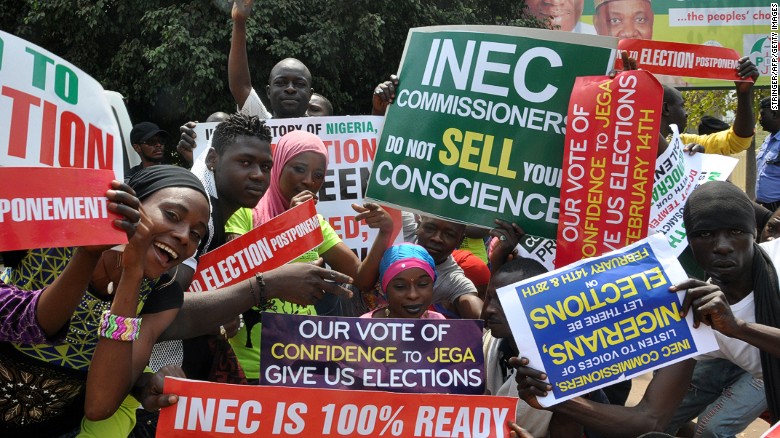
People in Abuja hold signs Saturday to protest the postponement of the Nigerian elections.
- Nigeria has just postponed their national elections by six weeks, now to be held on the 28th March.
The
decision is extremely controversial as these elections are set to be
the closest since Nigeria returned to democracy in in 1999, after
decades of coups and military rule.
The
military say they need to concentrate on a new offensive against the
Islamic militant group, Boko Haram, in north-east Nigeria. But it is
likely no coincidence that the offensive comes after incumbent President
Goodluck Jonathan also pushed for a postponement of the elections.
Nigeria's
opposition party have called the postponement a "setback for
democracy," as they now fear the military's decision to force the
postponement threatens not only their momentum, but the election itself.
But
this is a problem not just for Nigeria. U.S. Secretary of State, John
Kerry, has released an unusually strong statement saying the U.S. is
"deeply disappointed." He goes on: "Political interference with the
Independent National Electoral Commission is unacceptable, and it is
critical that the government not use security concerns as a pretext for
impeding the democratic process."
U.S.-Nigeria
relations are at a nadir, and at risk is America's relationship with
one of its most important allies in a region threatened by one of the
world's most violent terrorist groups, Boko Haram.
The
intervention by the military is a serious blow not just to this
election but also Nigeria's young democratic process. And it couldn't
happen at a more dangerous time.
Despite
being one of the fastest growing economies in the world, Nigeria's oil
dependent economy has been rocked by falling oil prices, with the worst
performing stock market in Africa, record lows for the Naira currency,
and depleted foreign exchange savings.
But
perhaps the biggest danger is Boko Haram, which has made dramatic
territorial gains over the past few months in the North East, and
despite the latest offensive to counter the threat, they continue to
attack major strategic towns.
The
postponement brings new uncertainty and new dangers. In 2011, over 1,000
people were killed in post-election violence after Goodluck's victory,
as a Christian southerner, which was seen as illegitimate in the mostly
northern, Islamic region of the country. This time, people's hopes,
tempers and disillusionment are, if anything, even higher.
Nigeria
has an immense ability to absorb crises and the military's direct
threat to the electoral process has passed, not without comment, but
without incident.
But there are now six weeks to the election. The fear is that this is simply the quiet before the perfect storm.


No comments:
Post a Comment